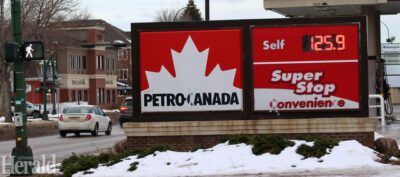Multiple factors influence local fuel price fluctuations
By Lethbridge Herald on December 28, 2022.
 Herald photo by Al Beeber
The price for a litre of regular grade fuel is seen in Lethbridge Tuesday morning. Many factors are said to affect gas prices
Herald photo by Al Beeber
The price for a litre of regular grade fuel is seen in Lethbridge Tuesday morning. Many factors are said to affect gas pricesAl Beeber – LETHBRIDGE HERALD – abeeber@lethbridgeherald.com
Lower gas prices may have given Lethbridge drivers a collective sigh of relief but the cost of fueling up is still more here than some other communities in the province.
According to gasbuddy.com, the cheapest price for regular grade gasoline in Lethbridge Tuesday morning was 121.9 cents a litre at Costco, which requires a membership to access the pumps.
The Gas Plus on Jerry Potts Blvd. was charging 123.9 cents per litre while a Husky on 13 St. N. had its price listed at 123.9. One station was charging 125.8 while other fueling stops had regular priced at 125.9.
In Claresholm, a popular stop with travellers heading north, the lowest price for regular Tuesday morning was 112.9 cents per litre at a 7-Eleven. Three other stations were charging 113.9 while another had regular listed at 117.9.
Two stations in Coaldale Tuesday were charging 125.9 while prices in Taber ranged from 124.9 to 140.6.
Motorists in Calgary meanwhile could get regular for as low as 106.9 with other stations charging up to 109.9.
The lowest price in the provincial capital Tuesday was 101.9 with other stations charging between 104.9 and 109.9.
Until Dec. 31, the Alberta government is charging a fuel tax on all grades of gasoline as well as diesel and ethanol/biodiesel of $0.045 per litre. This means for every litre of fuel purchased, Albertans pay 4.5 cents in taxes. From Jan. 1 until June 30, there will be no tax applied to those fuels.
From Nov. 1, 2015 until March 31 of this year, Albertans were paying $0.13 per litre tax on fuel.
A question and answer page on the Government of Canada website from 2016 says “many factors, apart from the price of crude oil” affect the price of gasoline in any particular area.
Those factors can include “transportation costs that are incurred to deliver the fuel to retailers, as well as costs for refining and marketing, margins, inventory levels and problems with local supply,” says the government.
Prices can vary for various reasons including the fact that fuel stations in remote areas will pay higher transportation costs to get the gasoline to consumers. Stations in smaller communities need to sell their fuel at a higher price to meet fixed costs because they sell less fuel than stations in bigger centres.
Competition can also impact prices – if a community has more stations, that competition can help prices lower than in places with fewer fuel sellers.
15-14




